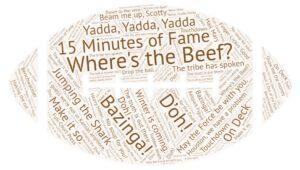Below is a list of common words and phrases that come from American media & sports. I have found that even high-level English speakers are sometimes unfamiliar with these. Below the list, there is a description of its origin, a definition, and a couple of example sentences. In class, I pass out the unexplained list and have students speculate about each term’s origin and meaning. I then divide the class into groups and have them research a certain portion of the terms. After that, we jigsaw and students share what they have learned. Here is a Google Doc version of the materials.
TV shows, Movies, Commercials
- Where’s the Beef?
- Jumping the Shark
- 15 Minutes of Fame
- Watergate or ….gate (e.g. Monicagate, Pizzagate, Deflategate, Nipplegate)
- Yada, Yada, Yada
- I guess we’re not in Kansas anymore.
- May the Force be with you.
- The tribe has spoken
- Bazinga!
- Winter is coming.
- The truth is out there
- Make it so.
- D’oh!
- No soup for you!
- Beam me up, Scotty
- Show me the money
- I am the one who knocks
- Houston, we have a problem
- Finger-Lickin’ Good
- What Happens in Vegas, Stays in Vegas
 Sports-related terms:
Sports-related terms:
- Monday Morning Quarterback
- Making the cut
- The ball is in your court
- On Deck
- Full-Court Press
- Benchwarmer
- Ballpark Figure
- Hail Mary
- Knock It Out of the Park
- Heavy Hitter
- Down for the Count
- Sudden death
- Touchdown
- Drop the ball
- Down to the wire
Where’s the Beef?
Origin: This phrase comes from a 1984 Wendy’s fast-food commercial.
English Definition: Used to question the substance or validity of something; asking where the important or substantial part of something is.
Example Sentences:
- The politician made a lot of promises, but where’s the beef?
- The movie had great special effects, but where’s the beef in the storyline?
Jumping the Shark
Origin: This term comes from a “Happy Days” episode where Fonzie literally jumps over a shark while water-skiing.
English Definition: The moment when a TV show, series, or other endeavor declines in quality or loses its original appeal.
Example Sentences:
- Many fans think the show jumped the shark when the main character left.
- The sequel was so bad that it felt like the franchise had jumped the shark.
15 Minutes of Fame
Origin: This phrase is attributed to artist Andy Warhol, who mentioned that everyone will be famous for 15 minutes.
English Definition: A brief period of celebrity or notoriety.
Example Sentences:
- His viral video gave him his 15 minutes of fame.
- She enjoyed her 15 minutes of fame after winning the contest.
Watergate or ….gate (e.g., Monicagate, Pizzagate, Deflategate, Nipplegate, and many others)
Origin: The term originates from the Watergate scandal, involving the Nixon administration in the 1970s.
English Definition: Used as a suffix to denote a scandal, often in politics or entertainment.
Example Sentences:
- After the cheating scandal, people started calling it “Examgate.”
- The celebrity’s public meltdown was quickly dubbed “Meltdowngate.”
Yada, Yada, Yada
Origin: Popularized by the TV show “Seinfeld.” (Season 8, Episode 19)
English Definition: Used to indicate that further details are predictable or boring; skipping over the mundane.
Example Sentences:
- He went on about his vacation, the great food, the beautiful scenery, yada, yada, yada.
- She said they met, had dinner, yada, yada, yada, and now they’re dating.
I Guess We’re Not in Kansas Anymore
Origin: From the movie “The Wizard of Oz.”
English Definition: Used to express that one is in a completely different or unfamiliar environment or situation.
Example Sentences:
- When he saw the advanced technology at the new company, he said, “I guess we’re not in Kansas anymore.”
- Stepping into the bustling city, she thought, “I guess we’re not in Kansas anymore.”
May the Force Be with You
Origin: From the “Star Wars” franchise.
English Definition: A wish for good luck or encouragement, often used in challenging situations.
Example Sentences:
- As she went in for her job interview, her friend said, “May the Force be with you.”
- Before the big game, the coach told the team, “May the Force be with you.”
The Tribe Has Spoken
Origin: From the reality TV show “Survivor.”
English Definition: Used to indicate that a group has made a decision, often a final or irrevocable one.
Example Sentences:
- After voting on the new policy, the boss said, “The tribe has spoken.”
- When everyone agreed to go to the same restaurant, Sarah declared, “The tribe has spoken!”
Bazinga!
Origin: From the TV show “The Big Bang Theory” main character, Sheldon Cooper
English Definition: An exclamation used to highlight a joke, prank, or clever comment.
Example Sentences:
- After successfully pulling off a prank, he shouted, “Bazinga!”
- She solved the difficult math problem effortlessly and said, “Bazinga!”
Winter is Coming
Origin: From the TV series “Game of Thrones,” based on the “A Song of Ice and Fire” books.
English Definition: A warning or reminder that difficult or challenging times lie ahead.
Example Sentences:
- As the company braced for economic downturn, the CEO said, “Winter is coming.”
- Before the final exams, the teacher reminded the students that winter is coming.
The Truth is Out There
Origin: From the TV show “The X-Files.”
English Definition: Used to suggest that the truth about a particular subject or situation is yet to be discovered.
Example Sentences:
- Despite all the conspiracy theories, remember, the truth is out there.
- She’s determined to prove her theory correct because she believes the truth is out there.
Make it So
Origin: From the TV series “Star Trek: The Next Generation.”
English Definition: A command to execute a plan or make something happen; often used to give the go-ahead.
Example Sentences:
- After reviewing the project proposal, the manager said, “Make it so.”
- She looked at the design sketches and told her team, “Make it so.”
D’oh!
Origin: From the TV show “The Simpsons.”
English Definition: An exclamation used to express frustration, realization of a mistake, or disappointment.
Example Sentences:
- He forgot his keys at home and exclaimed, “D’oh!”
- When she realized she had missed the deadline, she said, “D’oh!”
No Soup for You!
Origin: From the TV show “Seinfeld.”
English Definition: A humorous way to say that someone will not get what they want; often used to deny a request.
Example Sentences:
- When he asked if he could leave work early, his boss replied, “No soup for you!”
- She tried to cut in line, but the security guard said, “No soup for you!”
Beam Me Up, Scotty
Origin: Although never exactly said in the “Star Trek” series, it’s a paraphrase often attributed to it.
English Definition: Used to express a desire to escape a frustrating or bewildering situation.
Example Sentences:
- Stuck in a boring meeting, she thought, “Beam me up, Scotty.”
- When the date was going horribly, he wished he could say, “Beam me up, Scotty.”
Show Me the Money
Origin: From the movie “Jerry Maguire.”
English Definition: A demand for proof of value or worth, often in a financial context.
Example Sentences:
- During the negotiation, he leaned in and said, “Show me the money.”
- She was skeptical of the investment opportunity and said, “Show me the money.”
I Am the One Who Knocks
Origin: From the TV series “Breaking Bad.”
English Definition: A declaration of power or authority; used to assert control or dominance.
Example Sentences:
- When questioned about his leadership, he retorted, “I am the one who knocks.”
- She took charge of the project and declared, “I am the one who knocks.”
Houston, We Have a Problem
Origin: From the Apollo 13 mission, popularized by the movie of the same name.
English Definition: Used to indicate that there is a significant problem or obstacle.
Example Sentences:
- When the server crashed, the IT manager said, “Houston, we have a problem.”
- She opened the empty fridge and sighed, “Houston, we have a problem.”
Finger-Lickin’ Good
Origin: From KFC (Kentucky Fried Chicken) commercials.
English Definition: Describes food that is extremely delicious.
Example Sentences:
- After tasting the homemade pie, he said it was finger-lickin’ good.
- The barbecue was so tasty, everyone agreed it was finger-lickin’ good.
What Happens in Vegas, Stays in Vegas
Origin: From Las Vegas tourism advertisements.
English Definition: Used to suggest that activities done in a certain place will remain secret.
Example Sentences:
- Before the bachelor party, he reminded his friends, “What happens in Vegas, stays in Vegas.”
- She winked and said, “Don’t worry, what happens in Vegas, stays in Vegas.”
Monday Morning Quarterback
Origin: American football terminology, often used in the context of hindsight criticism.
English Definition: A person who criticizes or suggests alternative courses of action after an event has occurred.
Example Sentences:
- It’s easy to be a Monday morning quarterback after the project fails.
- She hates Monday morning quarterbacks who offer advice after the fact.
Making the Cut
Origin: General sports terminology, often used in golf or team selections.
English Definition: Successfully meeting or exceeding the standards required for a particular group or activity.
Example Sentences:
- Only a few applicants end up making the cut for the scholarship.
- He trained hard all summer to make the cut for the varsity team.
The Ball is in Your Court
Origin: Tennis terminology.
English Definition: Used to indicate that someone has the responsibility to make a decision or take action.
Example Sentences:
- I’ve done all I can to help you; now the ball is in your court.
- She sent the final proposal to the client, saying, “The ball is in your court now.”
On Deck
Origin: Baseball terminology.
English Definition: Next in line or sequence; prepared and waiting.
Example Sentences:
- The next speaker is on deck and ready to go.
- With the project nearing completion, the team is on deck for the final review.
Full-Court Press
Origin: Basketball terminology.
English Definition: An all-out effort or strategy, often used in the context of aggressive action or pressure.
Example Sentences:
- The company launched a full-court press to improve sales.
- She’s putting a full-court press on to finish her thesis on time.
Benchwarmer
Origin: General sports terminology, often used in team sports like basketball or baseball.
English Definition: A player who rarely or never gets to participate in the game and spends most of the time on the bench.
Example Sentences:
- He didn’t want to be a benchwarmer, so he practiced harder to get more playing time.
- She was tired of being a benchwarmer and decided to switch to a different sport.
Ballpark Figure
Origin: Baseball terminology.
English Definition: An approximate numerical estimate or range.
Example Sentences:
- Can you give me a ballpark figure for the cost of the project?
- The contractor provided a ballpark figure for the renovations.
Hail Mary
Origin: American football terminology.
English Definition: A desperate, last-minute attempt to achieve something, often with a low probability of success.
Example Sentences:
- With the deadline approaching, he made a Hail Mary attempt to finish the report.
- She sent out a Hail Mary application to her dream school, not expecting to get in.
Knock It Out of the Park
Origin: Baseball terminology.
English Definition: To perform exceptionally well in an endeavor or activity.
Example Sentences:
- She really knocked it out of the park with her presentation.
- The team knocked it out of the park by winning the championship.
Heavy Hitter
Origin: Baseball terminology.
English Definition: A person with a lot of influence, power, or effectiveness.
Example Sentences:
- The company hired a heavy hitter to lead their marketing team.
- She’s a heavy hitter in the world of finance.
Down for the Count
Origin: Boxing terminology.
English Definition: Temporarily defeated or incapacitated; unable to continue.
Example Sentences:
- After pulling an all-nighter, he was down for the count and slept all day.
- The project seemed down for the count after losing its funding, but they found a way to continue.
Sudden Death
Origin: Various sports, including soccer, hockey, and golf.
English Definition: A method of breaking a tie where the first to score or achieve a specific outcome wins.
Example Sentences:
- The game went into sudden death overtime, raising the tension for both teams.
- She won the match in a sudden death playoff.
Touchdown
Origin: American football terminology.
English Definition: Scoring six points by carrying the ball into the opponent’s end zone or catching it there.
Example Sentences:
- The quarterback threw a perfect pass for a touchdown.
- With seconds left on the clock, they scored a touchdown to win the game.
Drop the Ball
Origin: General sports terminology.
English Definition: To make a mistake, especially by doing something in a careless or irresponsible way.
Example Sentences:
- He really dropped the ball when he forgot to submit the application on time.
- The company dropped the ball by not securing their data.
Down to the Wire
Origin: Horse racing terminology.
English Definition: Until the last possible moment; a situation where the outcome is not decided until the very end.
Example Sentences:
- The election was down to the wire, with both candidates neck and neck.
- The project came down to the wire, but they managed to finish on time.
Views: 42






Leave a Reply